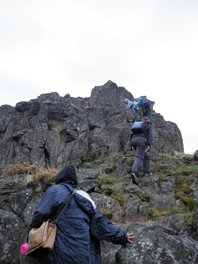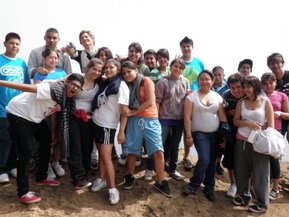
An internal debate rages as I nervously watch the teens scramble about the basalt formations. Half of me is joyful to watch them climb about and explore; this is why we came out here - this is what they need. Half of me wants to prohibit them from leaving the ground; if one of them falls I am so screwed.
I'm the leader/chaperone guy for a group of Portland teens, who fan out around the walls and caverns of HorseThief Butte. These crags are the stalwart remnants of a basalt monolith that survived the prehistoric glacial floods. We play hide and seek, evading one another behind rock outcroppings, laughing. Once we get our breath back, we climb to the top to eat our lunch. The Columbia River surrounds the escarpment like a horseshoe. Mt. Hood dominates the skyline with its sharp relief.
Before the creation of the dams, there was a Native American Village on these shores. The Columbia roared cascaded over a steep drop known as Celilo Falls.. For many and more generations, the Wishram and other indigenous peoples gathered their sustenance from the river, netting and spearing behemoth salmon. The dams flooded everything, buried the falls and the village. Today, hand crafted wooden fishing platforms remain along the shores; weathered white, the bones of what once was.
I'm the leader/chaperone guy for a group of Portland teens, who fan out around the walls and caverns of HorseThief Butte. These crags are the stalwart remnants of a basalt monolith that survived the prehistoric glacial floods. We play hide and seek, evading one another behind rock outcroppings, laughing. Once we get our breath back, we climb to the top to eat our lunch. The Columbia River surrounds the escarpment like a horseshoe. Mt. Hood dominates the skyline with its sharp relief.
Before the creation of the dams, there was a Native American Village on these shores. The Columbia roared cascaded over a steep drop known as Celilo Falls.. For many and more generations, the Wishram and other indigenous peoples gathered their sustenance from the river, netting and spearing behemoth salmon. The dams flooded everything, buried the falls and the village. Today, hand crafted wooden fishing platforms remain along the shores; weathered white, the bones of what once was.

After lunch, we find the gallery of pictographs left by the American Indians who called this place home so long ago, before the dams, when Condors soared here too.
The students ask me about the ancient depictions. “Who did them? Why?” they ask. “Why is this cool, but you got all mad that one time you saw graffiti on that rock?” Some answers come to me easier than others.
We set up our tents along a palisade of cottonwoods. After the chores of dinner, we gather back into the van and drive to one of our nation’s largest public stellar observatories in the nearby town of Goldendale.
This is the first camping trip for many of the students. Many have never seen the stars of a rural nightscape and none of us have ever seen the stars like this. We usher into the rotunda with a dozen other folks and take turns climbing a short ladder and peering into the rather small eyepiece on the posterior of a massive telescope. We view planets, galaxies, and nebulas. Our normally rambunctious crew is momentarily subdued with humility and wonder.
The observatory's docent leads the entire group into the warm night air and we all experience something for the very first time, a moon rise. We watch, captively quiet, as a luminescence swells in the distance.
The students ask me about the ancient depictions. “Who did them? Why?” they ask. “Why is this cool, but you got all mad that one time you saw graffiti on that rock?” Some answers come to me easier than others.
We set up our tents along a palisade of cottonwoods. After the chores of dinner, we gather back into the van and drive to one of our nation’s largest public stellar observatories in the nearby town of Goldendale.
This is the first camping trip for many of the students. Many have never seen the stars of a rural nightscape and none of us have ever seen the stars like this. We usher into the rotunda with a dozen other folks and take turns climbing a short ladder and peering into the rather small eyepiece on the posterior of a massive telescope. We view planets, galaxies, and nebulas. Our normally rambunctious crew is momentarily subdued with humility and wonder.
The observatory's docent leads the entire group into the warm night air and we all experience something for the very first time, a moon rise. We watch, captively quiet, as a luminescence swells in the distance.

I look around at our group of Latino Teenagers. Some have family in jail for gang activities. The documentation status of several is uncertain. A few speak very little English, but we have connected through a combination of my poor Spanish and their improving English. Their stories thread from a distant land their family left, to this country where their presence at times is less than welcome by vociferous masses. The future is uncertain and the present unstable. But for this moment, we wait together in silence, until a sliver of lunar light crests the horizon of the Columbia Plateau, and we collectively gasp.
The night is growing late and we drive back to our campsite. We discuss the probabilities of alien life and the myriad variables and hypotheses therein, and whether the infinite nature of the cosmos substantiates or diminishes the meaning of our lives, or if there is any meaning at all.
The next day, we languidly strike our camp. No one seems eager to pile back into the van and drive to the city. We take long moments to contemplate the landscape and breathe the desert air, as modern explorers of our land and our universe.
The night is growing late and we drive back to our campsite. We discuss the probabilities of alien life and the myriad variables and hypotheses therein, and whether the infinite nature of the cosmos substantiates or diminishes the meaning of our lives, or if there is any meaning at all.
The next day, we languidly strike our camp. No one seems eager to pile back into the van and drive to the city. We take long moments to contemplate the landscape and breathe the desert air, as modern explorers of our land and our universe.
 RSS Feed
RSS Feed